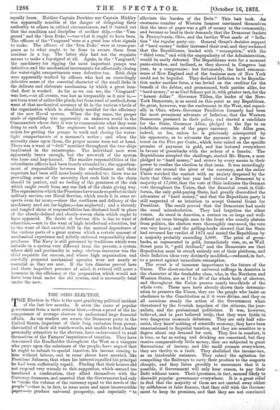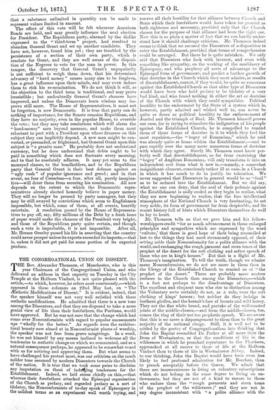THE OHIO FILTICTION.
THE Election in Ohio is the most gratifying political incident of the last few months. It saves the cause of popular government from a most serious blow,—from a proof of the in- competence of average electors to understand large financial affairs. As our readers are aware, the Democrat party in the United States, impatient of their long exclusion from power, distrustful of their old watch-words, and unable to find a leader personally attractive to the electors, have endeavoured to avail themselves of the Farmers' impatience of taxation. They have denounced the Bondholder throughout the West as a vampyre who preys upon the substance of the people, have argued that he ought to submit to special taxation, his income coming to him without labour, and in some places have asserted, like President Johnson, that when his interest equalled his principal he had been sufficiently repaid. Finding that their hearers did not respond very warmly to this suggestion, which seemed too barefaced a confiscation, they allied themselves with the Currency dreamers, and asserted that the Government had only to "make the volume of the currency equal to the needs of the people "—that is, in fact, to issue more and more inconvertible paper—to produce universal prosperity, and especially " to
alleviate the burden of the Debt." This bait took. An enormous number of Western farmers convinced themselves that the issue of paper was a gift of money to the community, and became so loud in their demands that the Democrat leaders in Pennsylvania, Ohio, and the further West made of " Infla- tion " the regular party cry. General Grant's decisive support of "hard money" rather increased their zeal, and theyreckoned that the Republicans, loaded with " resumption," with the " third term," and with the unpopularity of the Administration, would be easily defeated. The Republicans were for a moment panic-stricken, and inclined, as they showed in Congress last year, to a compromise ; but fortunately, the hard common- sense of New England and of the business men of New York could not be beguiled. They declared Inflation to be Repudia- tion under another form, a tax levied on the creditor for the benefit of the debtor, and pronounced, both parties alike, for "hard money," or as Carl Schurz put it, with greater tact, for the " honest dollar." Governor Tilden, the leader of the New= York Democrats, is as sound on this point as any Republican. So great, however, was the excitement in the West, and especi- ally in Ohio, where.Governor Pendleton formerly had been the most prominent advocate of Inflation, that the Western Democrats persisted in their policy, and started a candidate for the State, Governor Allen, pledged to the lips to an indefinite extension of the paper currency. Mr. Allen goes, indeed, so far, unless he is grievously misreported by his opponents, as to advocate the payment in paper of in- terest on the i'ive per Cents., which were raised on the specific promise of payment in gold, and has lectured everywhere in favour of greenbacks with the ardour of a fanatic. The Republicans accepted the challenge, started Mr. Hayes, a man pledged to " hard money," and strove by every means in their power to confine the election to that issue. It was accordingly fought out around the pivot of the currency, and the entire Union watched the contest with an anxiety deepened by the facts that Ohio only last year had elected a Democrat by a majority of 17,000, that the vote of Ohio indicates the German vote throughout the Union, that the financial crash in Cali- fornia, the only gold-paying State, had greatly discredited the advocates of "hard money," and that the Republican party is still suspected of an intention to accept General Grant for President. The result proved that the Democrats had made the usual miscalculation. They had forgotten the silent voters. As usual in America, a contest on so large and well- defined an issue brought men to the front who usually abstain from politics, the electors were thoroughly canvassed, the vote was very heavy, and the polling-books showed that the State had reversed her verdict of 1874 and seated the Republican by a majority probably exceeding 5,000. The price of green- backs, as represented in gold, immediately rose, or, as Wall Street puts it, " gold declined," and the Democrats see that Repudiation must be struck entirely out of their platform, and their Inflation ideas very distinctly modified,—reduced, in fact, to a protest against immediate resumption.
The event is of immense importance to the future of the Union. The sheet-anchor of universal suffrage in America is the character of the freeholder class, who, in the Northern and Western States, are as 17 to 20 of the whole body of electors, and throughout the Union possess nearly two-thirds of the whole vote. These men have already shown their determin- ation to preserve the Union, they are the people who insist on obedience to the Constitution as if it were divine, and they on all occasions steady the action of the Government when threatened by the feverish impulses of the citizens, the jour- nalists, and the professional politicians. It was, however, believed, and in part believed truly, that they were liable to very dangerous economic delusions. They are only half edu- cated, they know' nothing of scientific economy, they have been unaccustomed to Imperial taxation, and they are sensitive to a degree about any demand for cash. They live in comfort, it is true, as far as eating and drinking are concerned, but they receive comparatively little money, they are subjected to great fluctuations of income, and like small yeomen everywhere, they are thrifty to a fault. They abolished the income-tax, as an intolerable nuisance. They raised the agitation for compelling the Railways to carry their produce to the seaports cheaply, and they listen greedily to assurances that it is possible if Government will only hear reason, to pay their Debt without taxes. Their ignorance, in fact, seemed likely to discredit popular government everywhere. It is a great relief to find that the majority of them are not carried away either by selfishness or false finance, that they still wish the Govern- ment to keep its promises, and that they are not convinced that a substance unlimited in quantity can be made to represent values limited in amount.
The effect of this vote will be felt wherever American Bonds are held, and may greatly influence the next election for President. The Republican party, alarmed by the dislike expressed to the " third-term " project, had resolved to abandon General Grant and set up another candidate. They have not, however, found him yet ; they are troubled by the persistence of a section of their own party, which is resolute for Grant, and they are well aware of the disposi- tion of the Negroes to vote for the man in power. In this temper, the discovery that General Grant's unpopularity is not sufficient to weigh them down, that his determined advocacy of "hard money" causes many sins to be forgiven, has a great influence upon their minds, and may even induce them to risk his re-nomination. We do not think it will, as the objection to the third term is traditional, and may prove irresistible ; but undoubtedly General Grant's chances have improved, and unless the Democrats learn wisdom may im- prove still more. The House of Representatives, it must not be forgotten, is now Democratic. It is true that party can do nothing of importance, for the Senate remains Republican, and they have no majority, even in the popular House, to override the veto ; but they may take resolutions which will alarm the " hard-money" men beyond measure, and make them most reluctant to part with a President upon whose firmness on this subject they can implicitly depend. A new man might be con- verted, or persuaded, or frightened, but General Grant upon this subject is " a granite man." He probably does not understand currency, but he does understand that debts ought to be paid in something which does not fluctuate every morning, and to that he resolutely adheres. It may yet seem to the moneyed classes, to the bondholders, and to the Republican party that General Grant is their best defence against an " ugly rush " of popular ignorance and greed ; and in that event, no fear of Ca3sarism—a fear, after all, purely imagina- tive—will deter them from securing his nomination. All now depends on the extent to which the Democratic repre- sentatives already elected honestly believe in paper money. They will no longer be pressed by party managers, but they may be still swayed by convictions which seem to Englishmen impossible, but which, some of them, at all events, heartily entertain. A resolution pasted by the House of Representa- tives to pay off, say, fifty millions of the Debt by a fresh issue of paper would make the chances of the President very bright, and those of the Republican party quite certain, and though such a vote is improbable, it is not impossible. After all, Mr. Horace Greeley passed his life in asserting that the country could never prosper unless its exports exceeded its imports,—that is, unless it did not get paid for some portion of its exported produce.



































 Previous page
Previous page